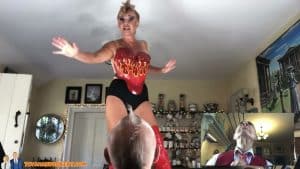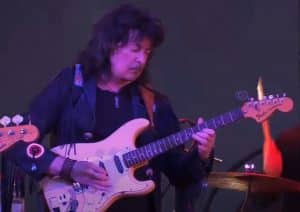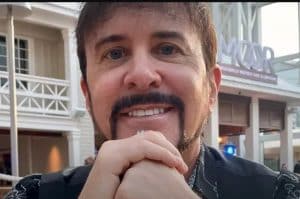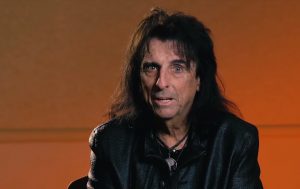12 Weird Facts Behind Dee Snider’s Career
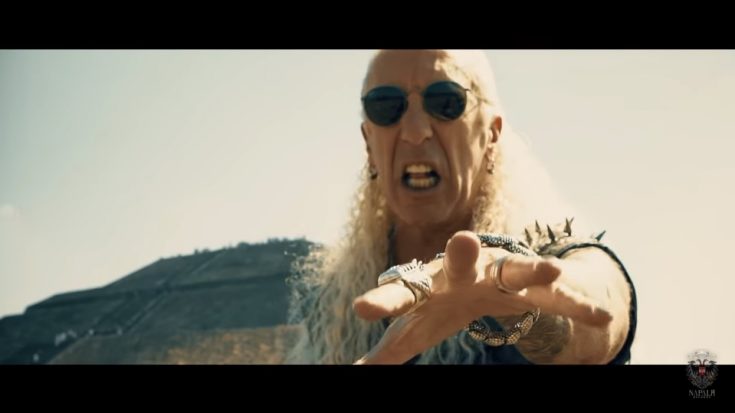
Dee Snider in For The Love of Metal - Napalm Records / Youtube
With his larger-than-life persona to his unforgettable music, Dee Snider has left an indelible mark on the world of rock and entertainment. Delve into the fascinating aspects of his career with these in-depth insights.
Joining Twisted Sister in 1976
Dee Snider was born in Long Island, New York in 1955. He grew up with five siblings and did not like the strict rules of his dad, Bob. Dee expressed himself through music, messy bedroom and long hair; it was a struggle for him to be himself in a ‘suburban wasteland.’ After high school, Dee performed with several bands like Harlequin and Peacock. Unfortunately, after Peacock, he tried and failed to form a new band called Heathen. He heard about Twisted Sister, who was looking for a singer, auditioned and joined the band within days.
As the lead singer and songwriter of Twisted Sister, Dee Snider was heavily influenced by bands like Queen and Black Sabbath. In February 1976, he sang Led Zeppelin songs for the band and was asked to join. Since then, he played an important role in the success of the band’s music.
Dee Snider’s Involvement in the 1998 Horror Film ‘Strangeland’
Dee Snider not only starred but also wrote and produced the 1998 horror film, Strangeland. The film tells the story of a detective who pursues a sadist called Captain Howdy, who lures teenagers into his traps through the internet. Snider himself played the role of Captain Howdy in the movie. The heavy metal band Twisted Sister also appeared on the soundtrack of the film alongside other bands.
Aside from Strangeland, Snider made an appearance as himself in the 1997 film Private Parts and as Lance Rockett in the TV series Holliston from 2012-2013. Not only was Snider a successful musician but also an actor and producer in the world of horror movies.
Dee Snider’s S.M.F. Tribute Band: Tour and Album Release
Dee Snider’s S.M.F. (Sick Mutha F*ckers) tribute band, named after the Twisted Sister song “S.M.F.,” toured during the ’90s and released an album in 1997. The band’s name was also an homage to the fans of Twisted Sister, known as the S.M.F. Friends of Twisted Sister. Dee Snider’s S.M.F. performs and pays tribute to the music of Twisted Sister by covering the band’s popular hits.
In October 2018, the band’s 1997 album was re-released, bringing back the nostalgic and historic music for many fans to enjoy once again. The tribute band also contributed to the 1998 compilation album, The Black and The Pink, with their song “The Kids Are Back.” The song appears as the first track on the glam rock emphasized second disc, The Pink, while the first disc, The Black, features goth rock.
Dee Snider’s Testimony Before Congress on Music Censorship
In September 1985, Dee Snider famously testified before Congress regarding music censorship, particularly in response to Tipper Gore and the Parents Music Resource Center (PMRC). Clad in jeans and a T-shirt, Snider challenged Gore’s interpretations of his songs and defended artistic freedom in the music industry.
Although Vince Neil was initially considered to testify, Snider’s articulate testimony ultimately landed him in front of the US Senate’s Committee on Commerce, alongside other entertainers like Frank Zappa and John Denver. Snider addressed the PMRC’s “Filthy 15” list of songs deemed too intense and offensive, showcasing the misinterpretation of his own lyrics, such as “Under the Blade,” which he clarified was about surgery, not sadomasochism.
During his testimony, Snider proposed alternatives to censorship, emphasizing the importance of responsible parenting and the implementation of return policies instead of the PMRC’s suggested rating system. Snider recalled the moment Al Gore questioned him, and humorously revealed the meaning behind Twisted Sister’s fan club name, S.M.F., to the committee.
Dee Snider’s bold and unwavering stance against music censorship made a lasting impact during his testimony before Congress.
Dee Snider’s Voice Has Indeed Made Its Way Onto Both Radio And Television Platforms.
Dee Snider, known for his distinctive voice, has not only captivated audiences with his music but also on the airwaves and small screen. In 1997, Snider kickstarted his radio career hosting a program called “The House of Hair”. This radio show, airing in the United States, Mexico, and Canada, treats listeners to heavy metal tunes alongside Snider’s own commentary.
In 1999, Snider expanded his radio presence on the show called Dee Snider Radio, where he showcased his talents by portraying a remarkable seven different characters. Additionally, he co-hosted Fangoria Radio on Sirius Satellite Radio alongside Debbie Rochon.
Not limited to radio, Snider has also left his mark in the world of animation. He lent his voice to animated series, such as Spongebob Squarepants in 2009, where he voiced the character Angry Jack. In the 2012 series Secret Mountain Fort Awesome, Snider took on the role of the Tooth Fairy. He also contributed his voice talents to the character Duke of Detroit in the series Motorcity from 2012 to 2013.
Allowing Trump To Use “We’re Not Gonna Take It” But Not Paul Ryan
The way Dee Snider deals with the use of his song “We’re Not Gonna Take It” by politicians shows his beliefs and values. When Paul Ryan used the song during his campaign rally in 2012, Snider publicly expressed his disapproval and made it clear that he didn’t agree with Ryan’s political ideas, except for their shared interest in P90X exercise.
However, a few years later, in 2015, Snider allowed Donald Trump to use “We’re Not Gonna Take It” for his campaign. Snider felt that the song’s message of rebellion, speaking out, and fighting against the system resonated with Trump’s approach at the time.
However, in 2017, things changed. Snider and other members of Twisted Sister decided to request the removal of the song from Trump’s playlist. They disagreed with some of his policies and actions. This decision was made privately, without any need for public shaming or media attention.
Dee Snider’s decision regarding the use of his song by politicians demonstrates his dedication to aligning his music with messages and causes that truly reflect his personal values and principles.
The Villain in ‘Jak and Daxter: The Precursor Legacy’
Dee Snider, known for his work in radio and television, took on the role of the main villain in the video game ‘Jak and Daxter: The Precursor Legacy.’ Released in 2001 for the Sony PlayStation 2, Snider voiced the character Gol Acheron, who leads the Lurkers in their mission to conquer the universe. Despite his villainous role in the game, Snider’s performance added an intriguing layer to the gaming experience.
In 2015, when asked if he would do more work in the video game industry, Snider mentioned on Twitter that there were no such plans. Interestingly, ‘Jak and Daxter’ fans got to enjoy the games once again when they were re-released in December 2018, giving a new generation of players the chance to experience Snider’s portrayal of Gol Acheron.
Dee Snider’s Christmas Song Surprise for Celine Dion
Dee Snider wrote a special Christmas song called “The Magic of Christmas Day” as a gift for his wife, Suzette. Celine Dion ended up recording the song without knowing it was written by Snider, who originally named it “God Bless Us Everyone.” When approached about the song by producer Ric Wake on behalf of Dion, Snider humorously told Wake not to reveal to Dion that “Satan wrote a Christmas song.” Despite the jest, Snider insisted that Dion include the song in her album.
“The Magic of Christmas Day” became part of Dion’s album “These Are Special Times,” which sold an impressive eight million copies. Snider jokingly credits Celine Dion for helping pay for his house, referring to it as “the House that St. Celine built.” Additionally, Snider authored a memoir in 2012 called “Shut Up And Give Me the Mic,” following his earlier book “Dee Snider’s Teenager Survival Guide” from 1987.
Dee Snider’s Brief Stint in ‘Rock of Ages’
Dee Snider, known for his role as the lead singer of Twisted Sister, had a short but exciting run in the Broadway musical “Rock of Ages.” The show opened in April 2009 and ran until January 2015 before becoming an off-Broadway production. It is set to return to its original stage later in 2019. In the musical, Snider played the character of Dennis, the owner of the Bourbon Room, a nightclub threatened by a greedy real estate developer.
Snider’s appearance as Dennis lasted for approximately 11 weeks in 2010, and he expressed his desire to do it again. He had a great experience and enjoyed the camaraderie, excitement, and preparation that came with being part of a Broadway show. Snider found the experience to be magical in a different way than being in a rock and roll band. Despite not performing any of Twisted Sister’s famous songs like “We’re Not Gonna Take It” and “I Wanna Rock” in the show, Snider still found the whole experience surreal and cherished it as one of the great moments in his life.
Twisted Sister’s Fear-Inspired Album and Song
Twisted Sister’s debut studio album in 1982 featured a title track called “Under the Blade.” The band chose this song precisely because it represented their unique sound, was a favorite among fans, and was “f*cking metal!” However, the inspiration behind the song came from Eddie Ojeda’s fear of undergoing surgery. Lead vocalist Dee Snider explained that “Under the Blade” was written because Ojeda was afraid of going through the experience of being operated on, highlighting the common fear people have when they imagine being on a table, facing bright lights, and a surgeon’s blade. The song captures the fear of hospitals and being helpless in that situation.
The lyrics of “Under the Blade” garnered significant attention, particularly from Tipper Gore in 1985. As one of the founders of the Parents Music Resource Center, Gore claimed that lines such as “your hands are tied, your legs are strapped” and “you’re pinned against the side, a monster stands before you now” had sadomasochistic undertones. In response to the criticism from Gore, Snider strongly refuted her interpretation and clarified that the song’s lyrics solely focused on surgery and the fear it evokes. He emphasized that any notions of sadomasochism or bondage were purely in Gore’s own imagination.
During the late 1970s and early 1980s, Twisted Sister faced challenges in defining their identity and how they were perceived. According to Jay Jay French, one of the founding members, they weren’t just an ’80s hair metal band; they were a ’70s bar band that found success in the ’80s, a significant distinction in their minds. However, Rolling Stone magazine saw them differently. In a review of AC/DC’s album “Fly On The Wall” in 1985, journalist Tim Holmes described the changing direction of heavy metal and identified Twisted Sister as “the clown heir apparent to the gaping vacancy left by Alice Cooper.” Holmes praised Twisted Sister’s ability to fill the space with their cheerful yet rebellious songs that had a unique narrative style and a gritty coherence often absent in metal music.
In that same year, Twisted Sister collaborated with Alice Cooper on the track “Be Chrool to Your Scuel,” which was accompanied by a music video. Unfortunately, MTV banned the video due to its zombie theme, deeming it too gruesome for viewers. Despite the setback, Twisted Sister continued to make their mark in the music industry as Alice Cooper’s successors, leaving a lasting impact with their energetic performances and distinctive style.
Twisted Sister Inherited Alice Cooper’s Throne As Clown Heir, Rolling Stone Says
During the late 1970s and early 1980s, Twisted Sister faced challenges in defining their identity and how they were perceived. According to Jay Jay French, one of the founding members, they weren’t just an ’80s hair metal band; they were a ’70s bar band that found success in the ’80s, a significant distinction in their minds. However, Rolling Stone magazine saw them differently. In a review of AC/DC’s album “Fly On The Wall” in 1985, journalist Tim Holmes described the changing direction of heavy metal and identified Twisted Sister as “the clown heir apparent to the gaping vacancy left by Alice Cooper.” Holmes praised Twisted Sister’s ability to fill the space with their cheerful yet rebellious songs that had a unique narrative style and a gritty coherence often absent in metal music.
In that same year, Twisted Sister collaborated with Alice Cooper on the track “Be Chrool to Your Scuel,” which was accompanied by a music video. Unfortunately, MTV banned the video due to its zombie theme, deeming it too gruesome for viewers. Despite the setback, Twisted Sister continued to make their mark in the music industry as Alice Cooper’s successors, leaving a lasting impact with their energetic performances and distinctive style.
Snider’s Ventures Beyond Twisted Sister
After Twisted Sister’s initial run until 1988, the band reunited multiple times in the following decades, with their final tour taking place in 2016. However, during the periods when Twisted Sister was not active, their frontman Dee Snider ventured into other musical projects. In 1988, Snider formed a band called Desperado, consisting of bassist Marc Russell, drummer Clive Burr, and guitarist Bernie Torme. Sadly, Desperado’s journey was short-lived as they disbanded in 1990. Despite their breakup, their demo album titled “Bloodied but Unbowed” was not released until 1996.
Following the end of Desperado, Snider collaborated with Joey Franco and Al Pitrelli to create a new band called Widowmaker in 1991. They went on to release two albums, one in 1992 and another in 1994 respectively, showcasing their musical efforts beyond the realm of Twisted Sister.




